Before embarking on this new trip to the past, I would like to clarify a couple of details. First, as a fictional trip, I have to allow myself some "artistic" and temporary licenses and, second, the treatment with the characters with whom I interact is from the 21st century, with respect but as "equal to equal". I make this last nuance because of some criticism that I have received on previous trips for not treating the characters as they would at the time and in the place to which I am traveling. Having made these considerations, fasten your seatbelts because the journey begins...
And there I was, in the middle of a tangle of Chinese longshoremen in a huge river port on the Yangtze. As I waited to see where my host would appear, I realized that I hadn't noticed the little outfit the time machine had made for me. Seen what was seen around there, she was fashionable:a kind of sky blue silk toga with wide sleeves, cotton pants, a knee-length skirt and high felt boots. I have to tell my stylists if on some next trip they could put hair on me to remember my younger days. Although I was delighted with my Yull Brynner look that had accompanied me for years, it would not have been out of place to wear a good hair one of these days. Meanwhile, I saw in the distance how people parted to make way for a carriage. As my height was a few centimeters higher than the average of those present, when the horses stopped I saw get down from the chariot… it was Zheng He! As I could, I made room to approach him. Until some soldiers crossed my path and stopped me. I raised my hand so he could see me, but the soldiers interpreted it as an attack. They brandished their spears to strike at me, and in a reflexive act of self-defense I stretched out my arms to protect myself, closing my eyes as I shrugged to cushion the blow. But no, the spears froze in the air after hearing a scream. The soldiers lowered them, bowed to the admiral, and stood behind him.
-Hi Javier. I am Zheng He. Forgive my guard, they thought you wanted to attack me, "said the admiral as he bowed slightly.
-I'm the one who has to apologize for my ways. It was normal for them to think that," I replied, leaning in until my eyes met the hem of the long red robe that covered his entire body.
"Come with me. We'll ride the carriage to our destination at Juyong Pass, where you'll see the construction work on our wall.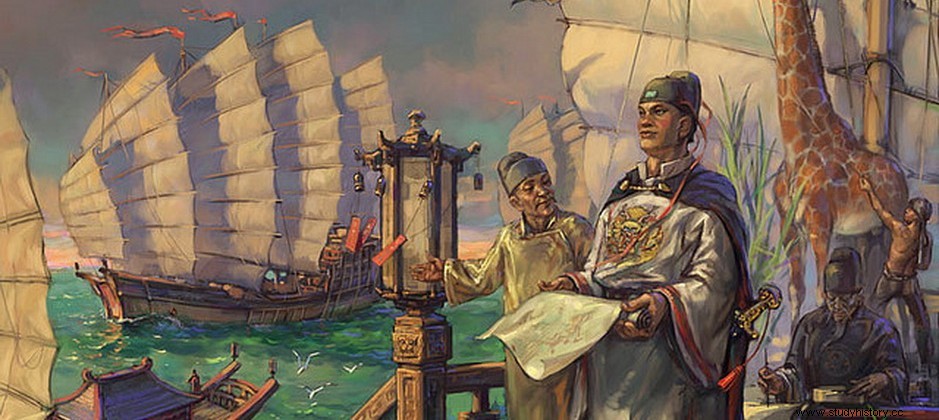
Zheng He (military, marine and explorer)
We settle into the carriage and set off for our destination.
-Then, you are interested in knowing how we built the wall and why we do it", he asked me starting the conversation.
-That is the reason for my visit admiral. And since you give me the opportunity, I would like to start with the reason for its construction
-I will. Actually, the custom of surrounding oneself with walls has existed in China for many centuries, when our current territory was a handful of kingdoms that fought among themselves to achieve hegemony over the rest. Until in 221 B.C. Qin Shi Huang, the king of Qin and the first emperor, managed to impose himself and unify all the territories under a single kingdom:China. All the inner walls that separated the different kingdoms were demolished, and the emperor ordered the connection between the pre-existing northern walls and the construction of other sections that would form a continuous first line, a precursor to the wall that my lord, the Yongle Emperor, and all the Ming dynasty want to build around our country.
-But once the kingdom is unified and pacified, I suppose that this new wall would have to do with an external threat.
-It has to do, specifically with the nomads from the northern steppes. From the time of our first emperor Qin Shi Huang, relations with nomads were determined by trade. The way of life of the nomads, based mainly on grazing and hunting, required our grain, textiles or tools. We, in turn, obtained furs and, above all, horses. While the trade flowed and they obtained what they needed, our relations were friendly, but from time to time, depending on their ambition and the cohesion between the different tribes, they raided our territory, destroying everything they could, what they needed and what they wanted. no, and they returned to the steppe to enjoy their loot. Even so, our response to their attacks was not influenced by revenge and by peace and understanding. After all, my good friend, we are the center of the world and we understand that the barbarians covet our riches, but we must act as the great civilization that we are.
-And what measures were taken in favor of the peace?
-Return to trade agreements and try to get the barbarians to cover their needs through trade and not through robbery; a policy of gifts, especially in the form of large rolls of silk, to placate the bellicose nomads; the Heqin, delivery of imperial princesses in marriage with the chiefs of the tribes, and the construction of a defensive wall to prevent future incursions of the barbarian hordes that, in addition, delimits the civilized world of the barbarian. As you will see, they are not exclusive, and each emperor, depending on the moment and the circumstances, focused on one or the other or directly on all of them. And despite the enormous cost that this entails for our economy, it is evidence of our desire for peace and progress.
-And have you never launched military campaigns to root out the problem?
- Logically our priority is peace, but when you put everything on your side to avoid war and the other side closes all the doors, you have no choice but to resort to military means, either with punitive raids or large campaigns of conquest. In addition, it is also good to show your enemies that we are not a weak or cowardly people. By the way, we are already arriving. We can -have some tea and then tour the part of the wall that we are reinforcing. Do you think so?
-Of course.
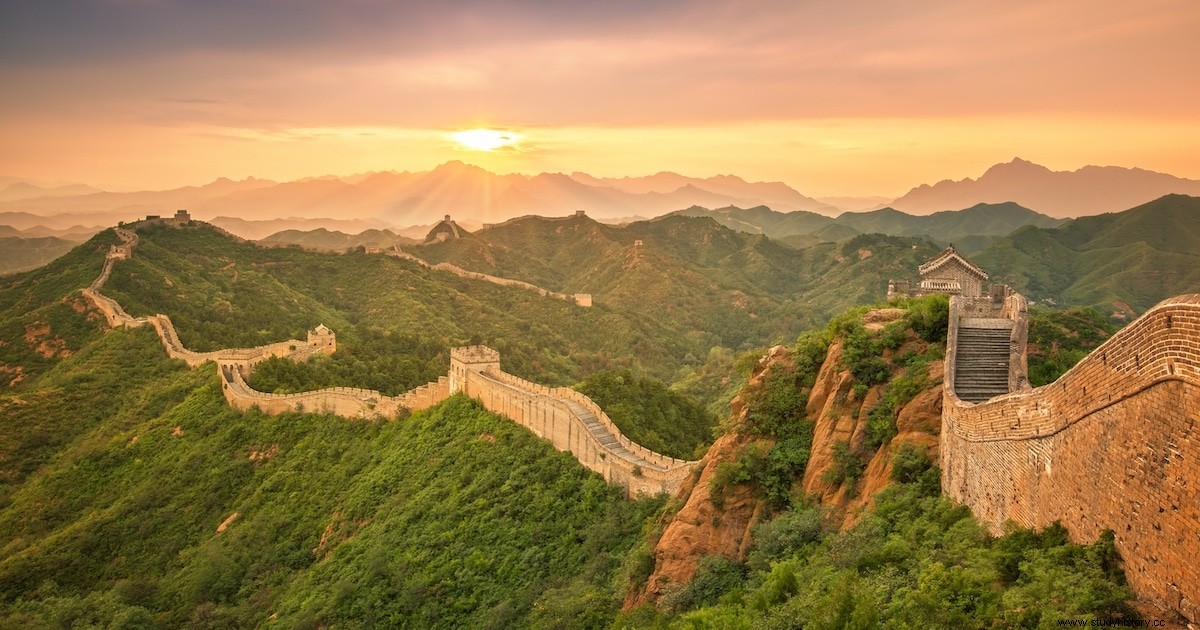
When I got out of the carriage, and as usual in my travels, I felt tiny again in front of what I had in front of me. Not only because of the imposing construction, but also because I looked to the right or left, it was impossible for me to see the end of such a work. We sat in the shade, in a place away from the hustle and bustle of workers who moved orderly from here to there. We were served tea and small packets made from bamboo leaves and filled with a ball of sticky rice. According to what Zheng told me, it was a traditional product called zongzi And by the way, it was delicious. After regaining strength, I resumed the conversation.
-So this is the idea of the emperor, to surround the territory with a great defensive wall that protects you from nomadic attacks, but also isolates you from the outside world.
-It protects us, it delimits the civilized world from the lands of the barbarians and isolates us from what we are not interested in or what we consider pernicious. In fact, the task entrusted to me by the emperor from the very beginning was to build a fleet to navigate the seas of the East and establish diplomatic and commercial relations with the different territories within our reach. So, it is a relative and interested isolation.
-From what I see, not all the wall is uniform in its shape and size
-Actually, it is not a single wall. It is rather a network of walls and different defensive structures built over time, under the mandate of different dynasties and in disparate ways. My lord's purpose is to take what is possible of the previous ones and build wherever it is needed to unify a continuous wall that goes from the edge of the Yalu River to the Gobi desert, some 6,000 kilometers. Logically, not all dynasties have had the same constructive desire as the Ming, that criterion depended on their will and also on the belligerent moment of our neighbors. If you look over those rocks, you will see that this wall has nothing to do with the one we are building now. While in the past the fortifications were built using compacted earth as raw material and layers of reeds were interspersed to drain the water, now a combination of stone at the base and brick elevation is used in most sections. In fact, this construction that you see, the Juyong Pass, is almost all new because this was one of the points that the Mongols used to cross our borders and settle in our territory for almost a century, until in 1368 the first emperor of the The Ming dynasty managed to expel them.
-And how did they manage to enter?
-The wall was not as robust as it will be now and, in addition, there are mountainous areas with abundant torrents and seasonal rivers, like the one we are now trying to protect and where construction is difficult, which go from authentic natural walls to silver bridges in the summer.
-Such a work requires very precise organization. How do you do it?
-Come with me and you will see it with your own eyes.
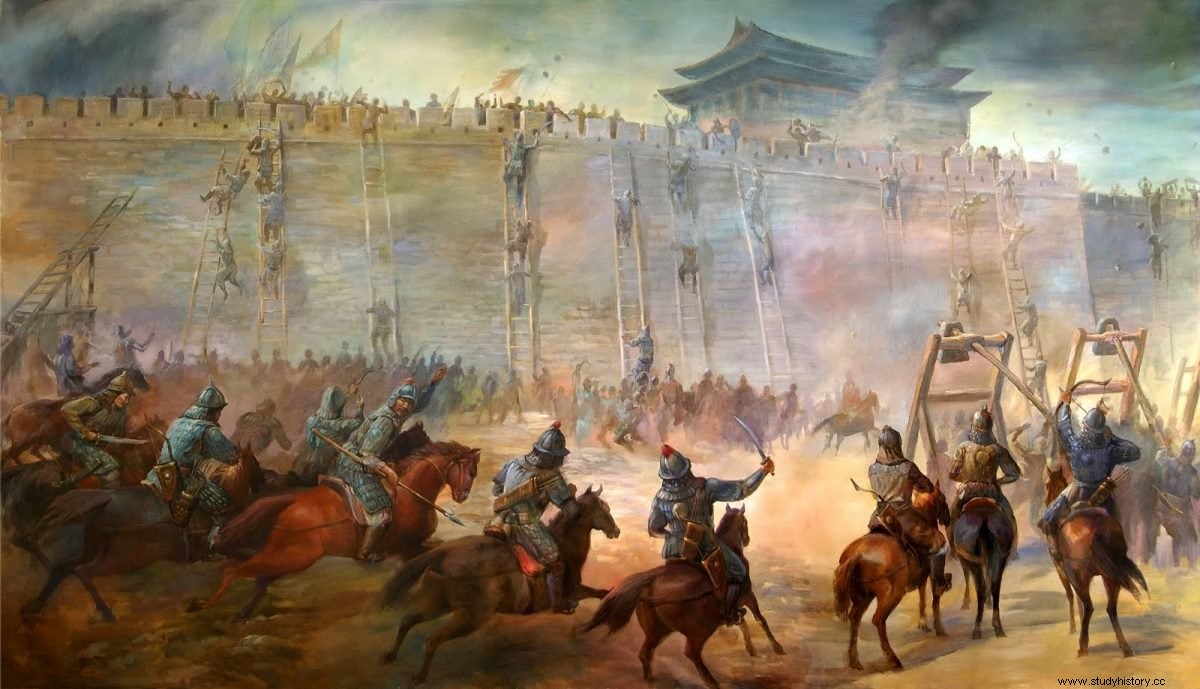
We got up and went for a walk among pack animals that transported large bricks from what looked like a factory to the base of the wall, workers who lifted them with pulleys or made human chains to carry them to the steepest areas, masons who They were placed with a mortar that they took from baskets...
As you can see, each of the workers knows what they have to do and everything is perfectly synchronized and studied to the millimeter. And I say everything, including details that may go unnoticed, such as the sections assigned to each group and the size of the bricks. Each group of workers is assigned a small section and they focus on it, when they finish they start another of the same length. In addition to providing greater order, morally it is not the same to start working on a small section, see how it evolves quickly and finish it, than to start a construction of, for example, several kilometers and see how the days go by and still there is a lot left to finish it. Just like the bricks. They are somewhat larger than those commonly used, but in this way the wall rises faster. Let's follow this bullock cart to the brickyard and I'll show you around. There are hundreds of factories like this distributed along all the sections of the wall where work is now being done.
We visited the old brick factory where the workers were busy in the different manufacturing processes:molding, drying, firing... A perfectly greased machinery to make bricks like churros, although something did not add up to me. For the firing of those huge bricks in the oven they needed large amounts of combustible material to get the right temperature, and I didn't see any wood or charcoal, nothing at all. So, I asked the admiral.
-Very insightful, my friend. Our energy source is natural gas. From the expression on your face I understand that you did not expect this answer. The truth, it was a chance discovery and the responsible was the salt. For centuries, even before we were an empire, salt has been of vital importance and has been tried to obtain in any way. Logically, the coastal populations had it easy:extract water from the sea and let it rest in shallow pools until the sun evaporated the water. The brine obtained was placed in containers and allowed to dry for subsequent commercialization, already crystallized. In the interior it was not so easy but they also had their methods to obtain it, such as repeating the process of the sea salt pans but with the water coming from springs whose current had passed through underground salt deposits. Another method of obtaining, also based on underground water currents but which required certain technology, was drilling. With huge bamboo drills with different metal tips, depending on the terrain, they were drilled until they reached the underground stream, the water was raised to the surface and there it was heated in pots to evaporate the water and obtain the salt. The problem was that, on occasions, those perforations did not find water but pockets of natural gas. After the first accidents, and deaths, we learned to channel this source of energy and use it as fuel to heat the pots. And that is the reason why in the factory you have not seen combustible material. Where the proximity of one of these deposits allows it, as here, we channel it through bamboo canes and take it to where it is needed.
-Admirable Admiral. From what I see those big pots on the left, where I think the zongzi rice has been cooked , is also heated by the same method.
-Yes and no. They are heated by the same system but the rice you ate has not been cooked there. That is done in kitchens. What is cooked there is rice, but for the wall.
-Sticky rice for the wall?
-Although it surprises you, I understand, it is one of the keys to our construction system. The mortar we use is made by mixing a sticky or glutinous rice paste, similar to that of zongzi, with dead lime, which is nothing more than limestone heated to a high temperature and then water is added.
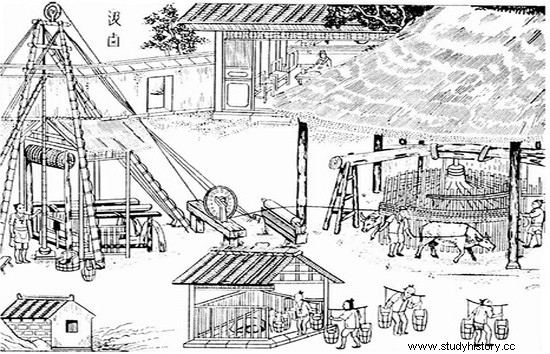
This is the surprising wall, a mixture of the most innovative technology, the use of the most basic and essential elements and, logically, a huge selfless workforce.
- And the workers? Because a lot of labor is needed here.
-There is everything. There are skilled workers such as master builders, bricklayers, stonemasons or those in the brick factory, and also prisoners of war and convicts whose sentence is to work on the wall. In addition, for the most serious crimes, if the convict dies before serving all the years of his sentence, one of his relatives must serve for him. But the largest workforce is made up of soldiers and peasants who, understanding that we must sacrifice ourselves for a work that benefits us all, volunteer to work when their obligations allow.
At that moment, one of the guards in the port who had been about to open my head approached the admiral and whispered something in his ear.
Wait a minute Xavier. I'll be right back
While contemplating that great work that even in our time would have been very difficult to undertake, one of the workers who was transporting bricks to the wall dropped the load next to me. I bent down to help him put it back and without raising his eyes from the ground he told me:" I'm not here voluntarily, they ripped me off my land and I had to leave my wife and children behind ” (because I don't know if you have noticed but the time machine, while transporting me to the past and taking care of my wardrobe, makes me a polyglot). He placed the wicker basket back on his shoulders and continued on his way. That peasant was the living image of abnegation and submission, he assumed the destiny imposed by the will of his emperor. I kept my eyes fixed on that man while he walked away from me, waiting for him to turn around to give him a friendly, understanding look... but nothing, he continued on his way. His only act of rebellion was barely a whisper in the ear of a foreigner. I couldn't do anything for him, but he did do something for me:give me the strength to question the admiral about where the wall workers who died were buried. In some article I had read that the dead were buried in the work itself and it was one of the questions I wrote down to ask on this trip, but in the last revision of my notes I decided to ignore it because it was a complicated subject that would surely offend. Now, after the farmer's comment, I felt compelled to raise it. And he would… While I was thinking about how to bring it up, another member of the Zheng's guard approached me and motioned for me to follow him to meet the admiral.
-Has something happened? -I asked surprised
-No, no. I simply have to accompany him to the next fortification where my lord awaits us.
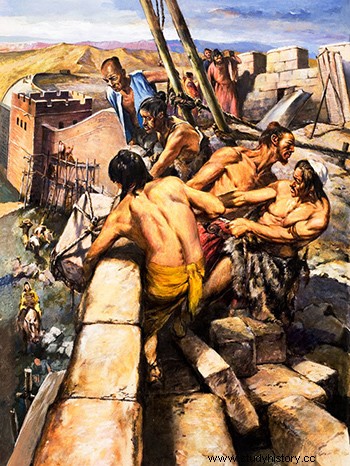
I followed his footsteps and, to my surprise, instead of going to where the horses and carriages were, we went towards the wall. We climbed the stairs and reached the top of that wall with the silhouette of a serpentine dragon, where the horses were waiting for us. We mounted and walked along the wall to the fortification where the admiral was waiting for us. It gave almost a sensation of vertigo to gallop along that wall of about 10 meters high and 5 meters wide. A small detachment was not waiting at the gates of what looked like a barracks embedded in the middle of the wall.
-What do you think of the wall from above? Zheng asked when he arrived.
-If from the base it gives a sensation of robustness and solidity, from above the sensation is of security, it seems impregnable.
-And so it should be. Not all parts of the wall are this high, but the parts we are building now are up to 10 meters and wide enough for soldiers to move quickly to where they are needed. For this reason, approximately every 800 meters we build watchtowers to prevent attacks and be able to warn, as well as dozens of fortifications, located at strategic points, with detachments of soldiers who can, from the safety of the wall, move and repel any attempt to invasion. In addition, if the number of enemy forces requires it, it can quickly communicate with the interior barracks near the border and in a short time have an army of thousands of men.
-And how do they communicate between the towers and the barracks?
-We have several options:flags, kites and smoke signals by day and torches by night. The proximity of the watchtowers allows messages to be transmitted during the day with simple flags, for minor issues, and to communicate with the fortifications or interior barracks, further away, smoke signals or kites. At night, communications between all points are made with torches.
-In the land where I come from, kites are for children
-And here too, but we have used them, and we follow them doing, for many other things. In fact, centuries ago they were used for fishing. A line and a hook were added and thus the fishermen could reach deeper areas from their small boats without leaving the safety of the coast, and even the largest boats could fish on remote reefs without the danger of running aground. . Then later, they were used by armies as visual or sound signaling devices (adding small bells or bamboo flutes that the wind would make sound) to transmit orders from a distance and even to bombard enemy positions. We also thought that, with a new sturdier frame and making them much bigger, they could hold a man up in the air. It cost, but we got it. This achievement opened up a range of possibilities for us in the military and civilian worlds, especially in construction. Imagine being able to supervise the work on the wall from above.
-From your tone, I understand that it was more an illusion than a reality.
-We managed to put it into practice, but there were more occasions when an accident occurred in which the birdman landed alive. So, we scrapped it and went back to traditional message kites. Speaking of messages, the flags at Juyong Pass announce that the food is ready. Shall we go back?
-Yes, of course. They did not think that such precise and concrete messages could be transmitted with the flags. No, no, I just told them to let us know when the food was ready.
We returned with the horses over the top of the wall and when we arrived all the workers, except the soldiers on guard, were lining up to receive their rations. From what I could see as I walked past them, this meal of noodle soup and a bowl of rice seemed insufficient for their waste of energy. I stayed a little behind and went back to see the peasant who whispered in my ear. He was sitting eating his rice. When he became aware of my presence, he put the bowl down and surreptitiously extended his hand to indicate a rock at the base of the wall. He collected his things, got up and joined a group of workers. I went to the indicated place and you can see an inscription engraved on the stone. I didn't understand what it said because it wasn't Mandarin, but it was clear that the farmer was sending me a message. When I turned around, one of the guards was already coming towards me. I walked with him and he led me to the table where Zheng had just sat down. As I already suspected, the food of the workers had nothing to do with the food that was served to us:jiaozi , a kind of dumplings stuffed with meat and served with a spicy sauce, bird's nest soup, rice with black eggs, steamed fish with soy and cucumber and for dessert a moon cake. After that lavish feast I would have had a good cup of coffee, but there it was, tea again. I took the opportunity to comment on the inscription on the wall.
-When we came to the table I noticed that there is an inscription engraved on the wall. Does it have to do with the work?
-There are official inscriptions, for example those related to the year of construction, the emperor or the master builder, and other unofficial ones made by the workers. In theory, the latter are not allowed but we turn a blind eye. They are also part of the wall and usually record poems that don't bother either. If you want, one of the members of my guard can accompany you and he will translate what he says there.
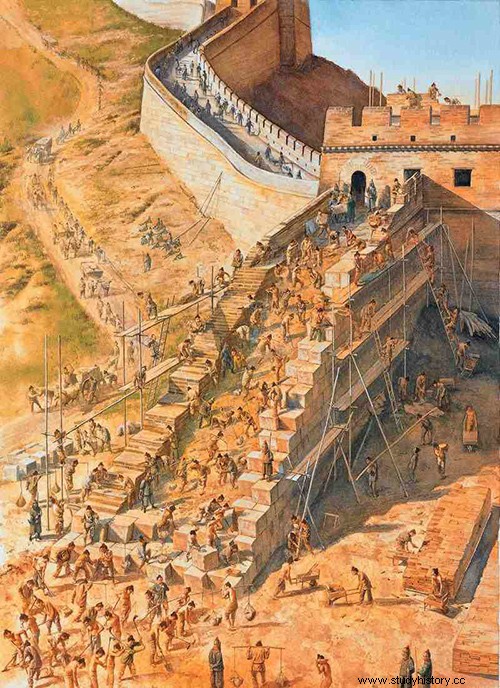
We reached the wall, I pointed to the inscription that the peasant had indicated to me and I looked at him waiting for his translation. He turned to the admiral and the admiral, nodding his head, gave his consent. Still, he was slow to reply. I looked at him again, as if asking for explanations, and from his face I understood that that poem was going to bother me anyway. He tore it off and read…
Every brick, every stone
and every centimeter of mud,
are mixed with people of the town,
with their bones, their sweat and their blood.
I don't know if that peasant had read my mind or if it had been Goddess Fortune's doing, but he had made it a point to interrogate Zheng about the legend that the wall was the largest cemetery in the world. He plucked up courage and when I got to the table and told the admiral what he put there, the smile on his face disappeared. Although he glared at his guard, he knew that he had only followed his orders.
-Surely it is something of some convict or prisoner of war. This is how they pay mercy. We commute the death sentence to forced labor, and instead of being grateful they vilify and insult us," he answered, trying to get out of that predicament.
-It looks like it, because if it's true, the inscription seems to of the dead workers end up being filler material for the wall -I said, diving headfirst into the wolf's mouth.
-Real stupidity, both your interpretation of the inscription and thinking that we used the wall as a cemetery. I am going to ignore your comment because you are an imperial guest, but I would ask you not to repeat it. In any case, seeing the complexity of the construction and the care that you have seen that we put into every detail, do you think we would make the mistake of burying bodies inside the wall? The structure would weaken when the bodies decomposed and, furthermore, by creating a hole inside, they would be feasible points of possible rupture and collapse.
-A thousand apologies, Admiral. I'm sorry I offended you. In my eagerness to know and know, I have exceeded myself. They will not happen again.
-It is a culture unknown to you and I understand that, from outside our borders, we are slandered, but you and I, as travelers, must travel the world without prejudice. Let's put this topic aside and have some mijiu , rice wine.
Good thing it wasn't more tea, because it was already saturated. So, I was grateful for a liquor that would make it easier for me to digest such abundant food. For a few minutes we remained silent while the waters returned to their course, and the workers went to work. I looked for the peasant and, without Zheng noticing him, when his eyes met mine, I gave him a half smile that implied an unspoken agreement between us. One way or another, he would be the protagonist of the Great Wall of China story. He owed it to him, he played it for me and I wasn't going to let him down. He got the wine and… Yuck! Although from my mouth came a loud Mmmm! There was no oven for buns, and I had no choice but to bite the bullet and finish that liquor whose flavor reminded me of the boiled water with rice that my mother prepared for me when I had stomach problems, but also fermented. The problem with this little white lie is that… I had to repeat it! This having to look good was going to destroy my stomach. I don't know if I wouldn't have to run away...
When you finish that cup we will go back up the wall so you can see the invention of one of our great researchers, Zhang Heng.
Just as removing a piece of adhesive tape from your skin is less painful to do all at once rather than piecemeal, I put that theory to work with my second cup of rice wine and drank it down in one gulp. I got up like a soul from the devil and said...
Whenever you want.
We headed back to the wall and when we got to the top he pointed out a large wooden box that I didn't notice as we passed by. The admiral gave the order and they began to open it. It was like a kind of large bronze pot that had eight dragons attached to its outside that held a bronze ball in its mouth and under each of them a frog, also made of bronze, with its mouth open, as if waiting for the ball. when falling.
-It's an earthquake detector that Zhang Heng invented centuries ago. How about? You're speechless, friend.
-It's just... I don't know what to say. Well yes, how does it work? The ideal would be that he could anticipate it, but that is still impossible today. The dragons and frogs below them are arranged in such a way that they mark the eight primary directions. When the machine detects an earthquake, the dragon that is in the direction in which it has occurred lets the ball escape. In this way, the sound when the ball falls into the frog's mouth alerts us to the earthquake and, depending on which frog it has fallen on, we have the direction where the epicenter of the tremor has occurred. Thus, we can send help quickly and save many lives. Without these detectors, it is impossible for the detachments of soldiers to arrive in time to avoid greater evils.
-And where are they placed?
-We distribute them in strategic places where earthquakes have historically been more frequent, such as this one where we find ourselves.
-And what is the greatest distance at which an earthquake has been detected?
-Until today, they have been more than 600 kilometers away.
- As you said, the only thing missing is to invent a machine that detects them before and can give time to evict the populations.
-Everything will go away friend, everything will go
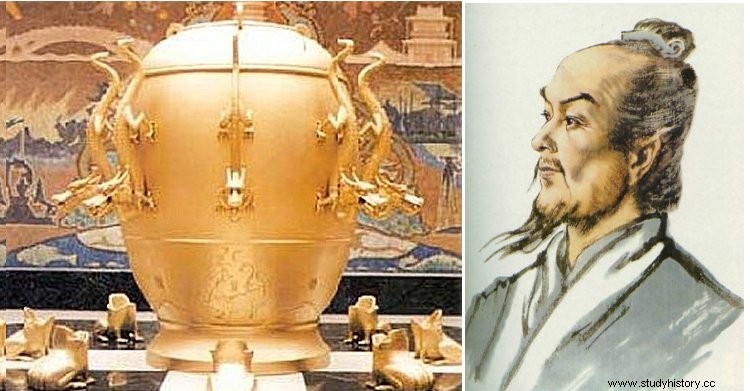
If I already felt small next to this mega-construction, now I was almost tiny compared to the ingenuity and sophistication of this ancient culture. While they were placing that directional seismograph, one of the officers addressed the admiral. He smiled and with his hand on the shoulder of his subordinate told me...
-They are going to change the guard and they ask me if you want to play cuju with them
-The cuju ? What is that?
-Soldiers practice it in their spare time to keep fit. They are divided into two teams and, without using their hands, they have to put a ball into the net to score. The one with the most points wins. Are you excited?
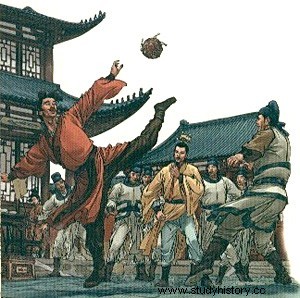
From the description it seemed like a mixture of football and basketball, sports that I have not been bad at. So, since I am one of those who joins in a bombardment and in my travels I preach “wherever you go, do what you see”, there I was with a group of soldiers with a kind of blue bib against those in bib red. The ball in question was made of leather and stuffed with feathers and about 30 centimeters in diameter. But what Zheng had called a network, it was, it was… it was impossible. La red en cuestión era un agujero recortado, poco más ancho que la pelota, en una tela seda y colgada en lo alto de dos palos de bambú… ¡a unos 9 metros! Vamos, llegaba casi hasta lo alto de la muralla y, lógicamente, no hacía falta portero. Aquel deporte era para jugones, y aquellos soldados eran unos verdaderos peloteros porque embocaron en varias ocasiones en aquella portería imposible. Yo, por mi parte, le eché muchas ganas, di y recibí golpes e hice algún intento por marcar pero me fue imposible. Aun así, y gracias a nuestro particular goleador, ganamos y me dieron el trofeo al… al invitado de honor.
Me quité aquel peto sudoroso y me refresqué antes de reunirme con el almirante.
-Si tuvieras un poco más de puntería, podrías ser el goleador del equipo porque tienes buen toque y le pones el alma.
-Me alaga almirante, sólo he intentado estar a la altura de sus soldados y no ser una carga para el equipo.
-Eres demasiado modesto Javier. Vayamos hasta el carruaje, ha llegado la hora de llevarte hasta el embarcadero. Espero que tu visita haya sido productiva y te lleves un buen recuerdo de nuestro mundo. Yo, por mi parte, seguiré navegando y espero llegar un día a tu tierra para conocer vuestras costumbres y a tus compatriotas. Allí tendrás que ser tú mi anfitrión. El oficial que ya conoces, el goleador de tu equipo, te llevará. Yo me despido aquí, tengo que reunirme con el emperador en Beijing, la nueva capital del imperio, donde vamos a construir la Ciudad Prohibida, el palacio de mi señor.
-Gracias por todo almirante. Y si alguna vez llega hasta el reino de Aragón, esa es mi tierra.
El oficial me acompañó hasta el establo, ensillamos los caballos y salimos a galope hasta el embarcadero donde, en teoría, debería esperarme el junco que me trajo hasta aquí. Cuando ya veíamos el río, el militar que me acompañaba, el mismo que había traducido el poema de la muralla, agarró las bridas de mi caballo, tiró de ellas y detuvo ambos caballos. Pensé que iba a hacerme pagar aquella mirada asesina que le había echado el almirante por lo del poema, pero no… más bien fue lo contrario. Miró a ambos lados del camino y cuando se cercioró de que no había nadie a nuestro alrededor, me dijo:“el enfado de mi señor tiene que ver con Meng Jiangnü ”. Sin dejarme decir ni esta boca es mía, me devolvió las bridas y continuó. Llegamos hasta el puerto, desmontamos, dejamos los caballos en un establo y me acompañó hasta el junco sin decir palabra alguna. Cuando me giré para despedirme, ya había desaparecido entre la multitud.
La frase del soldado seguía repitiéndose una y otra vez en mi cabeza… hasta que gracias al tío Google y a que todavía seguía entendiendo el mandarín (apenas duró unas horas), descubrí su significado. Tenía que ver con el cuento «Las lágrimas de Meng Jiangnu «, que forma parte del folclore y la historia de China. Cuenta la leyenda que, en tiempos del emperador Qin Shi Huang, los funcionarios imperiales recorrían los pueblos reclutando obreros para trabajar en la Gran Muralla. Ante la falta de voluntarios, ya que debían abandonar sus tierras y a sus familias, comenzaron a llevárselos por la fuerza. Y eso hicieron con Fan Xiliang, un joven campesino que acababa de casarse con su amada Meng Jiangnü. Tras un año de angustia, lágrimas y preocupación al no tener noticias de su marido, Meng Jiangnü decidió ir en su busca. Emprendió un largo y arduo camino, y a pesar del hambre, la fatiga y el frío consiguió llegar a la Gran Muralla. A todos los trabajadores que encontraba les preguntaba por su marido, hasta que llegó a la zona donde había trabajado. Allí le contaron que había muerto hacía poco más de un mes como consecuencia del agotamiento y las penosas condiciones de trabajo. Sus restos yacían en la muralla. Meng Jiangnü lloró desconsolada durante tres días, y tan desgarrador fue su llanto que provocó el hundimiento de un tramo de la muralla. Entre los escombros descubrió los restos de Fan Xiliang y Meng Jiangnü pudo ver a su marido una última vez. El emperador, enfurecido por el derrumbe de la muralla, ordenó ejecutarla, hasta que la vio en persona. La hermosura de la joven cautivó al emperador y quiso convertirla en su concubina. Al principio ella se negó, pero después de pensarlo detenidamente aceptó con la condición de que se le diese sepultura a Fan Xiliang y sobre su tumba se construyese un mausoleo. Además, el propio emperador debía asistir al entierro. Una vez cumplidas todas las peticiones y cuando el emperador fue a cobrar su recompensa, Meng Jiangnü se lanzó al mar y despareció para siempre. Cuentan que se reunió con su amado.
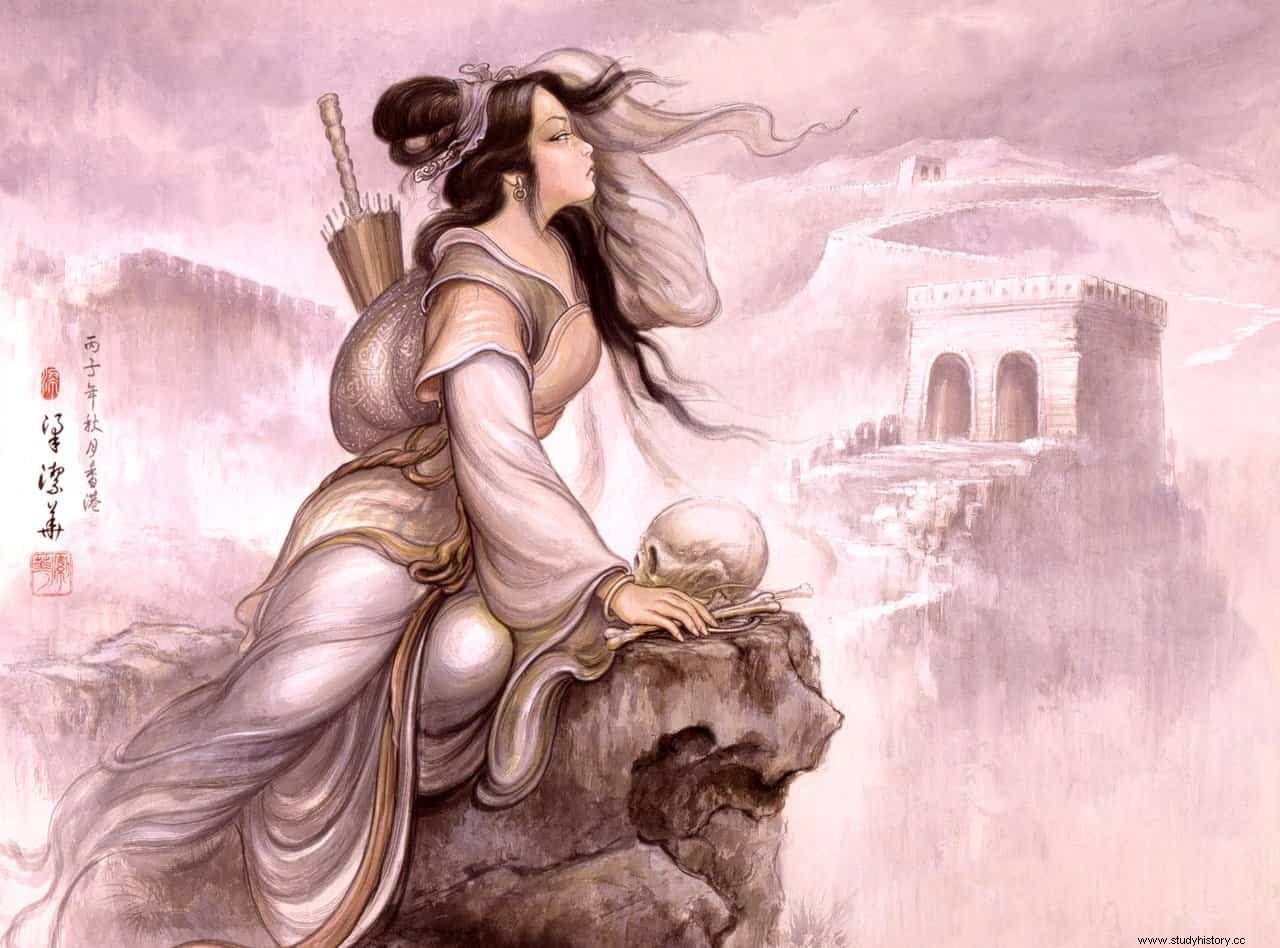
Si obviamos el mensaje o la moraleja de este cuento, es fácil extrapolar y concluir que los obreros muertos se enterraban en la muralla y, por tanto, que era un gigantesco cementerio. Y de ahí, que muchos hayan elevado este cuento a la categoría de fuente histórica para justificar este hecho del que, a fecha de hoy, no existe ninguna evidencia científica (además de la acertada respuesta del almirante). La moraleja de este cuento, a pesar de tener el guion de una historia de amor, es que la Gran Muralla es un símbolo del despotismo y la crueldad. Y a mi me gustaría creer, y esto es cosa mía, que también un homenaje a todos aquellos abnegados trabajadores anónimos, arrancados de sus hogares y separados de sus familias.
Fuente: Historias de la Historia (Storytel)
